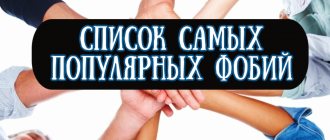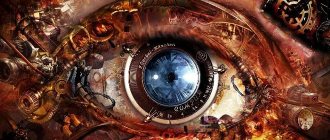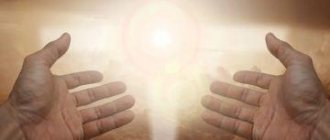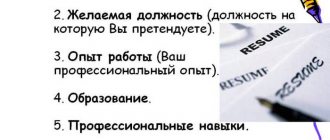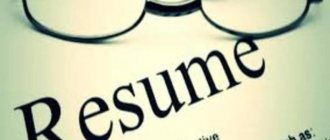Greetings, friends!
Every person knows and periodically uses the word “instinct”. For example, when explaining an unintentional action, we can say: “I did it instinctively.” However, many of us misunderstand what instinct is, with the result that the phrase often sounds like an inappropriate excuse. Today we will try to fill this gap and analyze in detail what instinct is. We will talk about the nature of this phenomenon, look at several examples and find out whether humans have instincts.
What are instincts
Instincts in psychology are an innate tendency of human behavior; it satisfies the needs of the body.
The definition of instincts in biology is a set of motor acts, forms of behavior that are characteristic of one or another type of living organism (according to A.D. Slonim).
In short, instinct means an innate form of behavior, it is genetically determined.
Differences from reflexes
Not all scientists draw a clear line between reflexes and instincts.
A reflex is a single, unconscious reaction of the body to the action of an external stimulus. In humans, this more often looks like the firing of one or more muscles at the same time.
The conditioned reflex is triggered by an already known stimulus (close your eyes if the light is suddenly turned on in a dark room). An unconditioned reflex looks like a reaction to something previously unfamiliar to a person (a new foreign sound).
Instinct is considered a complex behavioral reaction, a set of actions. It is a harmonious set of a number of reflexes.
Differences from needs
A need is what a person needs for survival and a sense of comfort. Needs also give rise to instincts.
Needs represent a wide hierarchy, they are numerous and multifaceted, each person has their own, which cannot be said about instincts. For example, the needs for communication, creative realization, awareness of one’s place in this world, etc.
Recommendations
- Lorenz, Konrad (1977). Behind the Looking Glass: The Quest for the Natural History of Human Knowledge
. New York: Harcourt Brace Jovanovich. ISBN 978-0-15-111699-7. - Raffles, Hugh (2010). Insectopedia
. New York: Pantheon Books. ISBN 978-0-375-42386-4. - James Rowland Angell, J. R. (1906). "The Essential Human Instincts," Chapter 16 in Psychology: An Introductory Study of the Structure and Functions of Human Consciousness
, Third Edition, Revised. New York: Henry Holt and Company. https://brocku.ca/MeadProject/Angell/Angell_1906/Angell_1906_p.html - McDougall, W. (1928). Introduction to Social Psychology
, 21st Edition, Methuen & Co. Ltd, London, p. vii. - McDougall, W. (1932). The Energies of Men: Exploring the Foundations of Dynamic Psychology
, Second Edition, Methuen & Co. Ltd, London, p.99. - Hjelle, Larry; Ziegler, Daniel (1981). Theories of Personality: Basic Assumptions, Research, and Applications
. McGraw-Hill. item 494. ISBN 9780070290631. - Maslow, Abraham H. (1954). "Instinct Theory Revisited". Motivation and personality
. New York: Harper and Row. - Birney R.S., Teevan R.S. (1961). Instinct: An Enduring Problem in Psychology
, Van Nostrand, Princeton, NJ.[
page needed
] - Herrnstein, R. J. (1972). "Nature as Nurture: Behaviorism and the Instinctive Doctrine." Behaviorism
.
1
(1): 23–52. JSTOR 27758791. - Mandal, F. B. (2010). Textbook of Animal Behavior
. PHI Learning. paragraph 47. ISBN 978-81-203-4035-0. - Buss, D. (2008). Evolutionary psychology: The new science of the mind
(3rd ed.). Boston: Allyn and Bacon. - Dickens, W. T.; Cohen, J. L. (2003). Instinct and choice: a basis for analysis.
In S. Garcia Call (Ed.), Nature and nurture: The complex interplay of genetic and environmental influences on human behavior and development. . Mahwah, NJ: Erlbaum. - Geary, D. K. (2004). Origins of the Mind: The Evolution of Brain, Cognition, and General Intelligence
. Washington, DC: American Psychological Association. - McDougall, W. (1928). Introduction to Social Psychology
, 21st Edition, Methuen & Co. Ltd, London, p. xxii. - ^ a b
Bloomberg, Mark S. (2017).
"Development evolves: the origins and meaning of instinct." Wiley Interdisciplinary Reviews: Cognitive Science
.
8
(1–2):e1371. doi:10.1002/wcs.1371. ISSN 1939-5078. PMC 5182125. PMID 27906515. - Hehl, Stephanie; Hellmer, Kahl; Johansson, Maria; Gredebeck, Gustav (2017). "Itsy Bitsy Spider...: Babies respond with increased arousal to spiders and snakes." Frontiers in Psychology
.
8
: 1710. doi:10.3389/fpsyg.2017.01710. PMC 5651927. PMID 29093687. - Bornstein, Marc H.; Putnick, Diane L.; Rigo, Paola; Esposito, Gianluca; Swain, James E.; Suwalski, Joan T. D.; Su, Xueyun; Du, Xiaoxia; Zhang, Kaihua; Cote, Linda R.; De Pisapia, Nicola; Venuti, Paola (2017). "The neurobiology of culturally common maternal responses to infant crying." Proceedings of the National Academy of Sciences
.
114
(45): E9465–E9473. doi:10.1073/pnas.1712022114. PMC 5692572. PMID 29078366. - Haun, Daniel B.M.; Rekers, Yvonne; Tomasello, Michael (2012). "Transmission with majority bias in chimpanzees and human children, but not in orangutans." Current Biology
.
22
(8):727–731. doi:10.1016/j.cub.2012.03.006. PMID 22503497. - Weierstal, Roland; Moran, James; Death, Gilda; Elbert, Thomas (2014). “Testosterone reactivity and identification with the perpetrator or victim in a story are associated with attraction to cues associated with violence.” International Journal of Law and Psychiatry
.
37
(3):304–312. doi:10.1016/j.ijlp.2013.11.016. PMID 24367977. - Gettler, L.T.; McDade, T. W.; Feranil, A. B.; Kuzawa, K. V. (2011). "Longitudinal evidence that fatherhood reduces testosterone levels in men." Proceedings of the National Academy of Sciences
.
108
(39):16194–16199. doi:10.1073/pnas.1105403108. PMC 3182719. PMID 21911391. - Toadstool, Nicholas M.; Sarafin, Ruth E.; Strenth, Chance R.; Zilioli, Samuele (2019). "Couple bonding, parenthood, and the role of testosterone: a meta-analytic review." Neuroscience and Biobehavioral Reviews
.
98
: 221–233. Doi:10.1016/j.neubiorev.2019.01.010. PMID 30639674. S2CID 58635068. - Dabbs, J.M.; Frady, R.L.; Carr, T. S.; Boesch, N. F. (1987). "Salivary testosterone and criminal violence in young adult prisoners." Psychosomatic medicine
.
49
(2): 174–182. Doi:10.1097/00006842-198703000-00007. PMID 3575604. S2CID 39757740. - Dabbs, James; Hargrove, Marian F. (1997). "Age, testosterone, and the behavior of female prisoners." Psychosomatic medicine
.
59
(5):477–480. Doi:10.1097/00006842-199709000-00003. PMID 9316179. S2CID 19900226. - Goetz, Stefan M.M.; Tang, Lingfei; Thomason, Moriah E.; Diamond, Michael P.; Hariri, Ahmad R.; Carre, Justin M. (2014). "Testosterone rapidly increases neural reactivity to threat in healthy men: a new paradigm for a two-step pharmacological task." Biological Psychiatry
.
76
(4):324–331. doi:10.1016/j.biopsych.2014.01.016. PMID 24576686. S2CID 23764095. - Curtis, Valerie; Aunger, Robert; de Barra, Micheál (2011). "Disgust as an adaptive system for disease avoidance." Philos Trans R Soc Lond B Biol Sci
.
366
(1563):389–401. doi:10.1098/rstb.2010.0117. PMC 3013466. PMID 21199843. - ^ a b c
Sokolowski, Kathy;
Corbin, Joshua G. (2012). "Programmed to Behavior: From Development to Function of Innate Limbic System Circuits." Frontiers in Molecular Neuroscience
.
5
: 55. doi:10.3389/fnmol.2012.00055. PMC 3337482. PMID 22557946. - Campbell, Neil A.; Rees, Jane B. (2002). Biology
(6th ed.).
San Francisco: Addison Wesley. ISBN 978-0-201-75054-6.[ page needed
] - Jaynes, Julian (1957). “Imprinting: the interaction of learned and innate behavior: II. Critical period." Journal of Comparative and Physiological Psychology
.
50
(1): 6–10. doi:10.1037/h 0044716. PMID 13406129. - Kim, Young-Jun; Žitžan, Dušan; Galizia, C. Giovanni; Cho, Kuk-Ho; Adams, Michael E. (2006). “The command chemical triggers innate behavior by sequentially activating multiple peptidergic assemblies.” Current Biology
.
16
(14): 1395–1407. doi:10.1016/j.cub.2006.06.027. PMID 16860738. S2CID 14745330. - Hogan, Michael (2010). "Beyond Revenge: The Evolution of the Instinct for Forgiveness" by Michael McCullough
.
Journal of Positive Psychology
.
5
: 97–100. Doi:10.1080/17439760903509614. S2CID 144005845.
Structure of instinctive behavior
Natural instincts involve searching and finishing phases.
During the search phase, a complex interweaving of innate and acquired instincts and behavioral components occurs. During this phase, instincts can change; the body learns new information and new ways of responding.
In the final phase, a certain set of behavioral reactions occurs. They are rigidly fixed, determined by the anatomical features of the body of a particular living organism. At this stage, the instinctive behavior of a living organism is studied.
Maturation
Some instinctive behavior depends on the emergence of maturation processes. For example, we usually talk about birds that “learn” to fly. However, young birds were experimentally raised in devices that prevented them from moving their wings until they reached the age at which their cohort could fly. These birds flew immediately and normally when released, showing that their improvement was the result of neuromuscular maturation rather than true learning.[27]
Physiological mechanism
Pavlov, in his scientific work, came to the conclusion that instinct is an unconditioned reflex, only more complex.
Basic instincts have a physiological mechanism:
- can be inherited only within one species;
- In order for instincts to work, exposure to an external stimulus is needed;
- Each instinct is a chain of neurons that are connected in series (reflex arc).
How birds find their way south
Speaking of birds. Twice a year, migratory birds accomplish something truly grandiose, if not impossible, and it is not only about overcoming vast distances, but also about choosing the direction of migration. They use many sources of information: the position of the sun and stars, some landmarks, and the planet’s magnetic field.
It seems that this is true instinct: having never been to a wintering place, the bird feels the need to fly exactly there. But in fact, young individuals do not immediately understand where they need to go, and only over time they comprehend the all-wise science of navigation. However, how this happens still remains a mystery. In some species, youngsters simply follow their flock, studying the route, while in others, apparently, the ability to choose the right direction is genetic (if you cross birds with different types of migration, the offspring may get lost).
So instinct is instinct, but it still needs to be learned. But the need to migrate clearly manifests itself instinctively: when the length of daylight changes, physiological changes are triggered in the birds’ bodies, which prompt them to prepare for migration, and then to fly.
Types of instincts with examples
Examples of instincts can easily be seen in the world of living nature. Types of instincts are divided into large groups:
- Vital (food, thirst quenching, immunity, etc.).
- Role-playing (parental, childish, etc.).
- Self-development instincts (study the world around you, engage in self-development, get to know yourself, etc.).
Survival and self-preservation
This is one of the innate instincts that ensure survival of a living organism. List of these instincts:
- timely and regular satisfaction of hunger (a person eats if he wants to eat);
- insulation during cold weather (when weather conditions worsen, a person buys or takes winter clothes out of the closet);
- treatment of diseases, poor health (in case of illness, a person consults a doctor or independently looks for how to alleviate his condition);
- the need to hide from direct sunlight in hot weather (in the heat a person sits at home or tries to be in the shade outside).
Instincts are considered natural, including humans. They manifest themselves especially clearly in extreme situations, for example, in the need to survive in wild, harsh conditions.
It is believed that the instinct of survival and self-preservation protects people from stupid, reckless actions and prevents them from risking their own lives. The instinct of survival and self-preservation is closely related to fear for oneself, for one’s life.
Have there been situations in your life when the instinct of survival and self-preservation helped you in difficult situations, or, conversely, saved you from danger? Share your stories in the comments, we will be very interested to read.
Sexual instinct to preserve the species
The instinct of procreation is characterized by the realization of one's sexual needs. A person can control this state at a higher level; it looks like affection, love, falling in love with one’s partner.
These feelings activate the instinct of procreation. However, it is not worth talking about it as applicable to all of humanity, because not all people want to have children; some deliberately remain childless. The same applies to the maternal instinct, which not all women exhibit.
Domination
This is a form of behavior that is carried out when there is a need to defend one’s power, leadership position, and show that one is the strongest.
Dominance is typical for animals (the leader in a pack of wolves), as well as for people (the desire to occupy leadership positions, manage others, lead them).
Alfred Adler, an Austrian physician and psychologist, believed that the “will to power” underlies personal development. An inferiority complex pushes a person towards dominance. To get rid of feelings of inferiority, a person strives to acquire the abilities necessary to solve social, professional and love problems.
Alfred Adler
Social
Social instincts mean a number of behavioral reactions that help to effectively interact with society. They look like a desire to help others, a manifestation of kindness, a desire for peace and prosperity.
Does everyone have a social instinct?
The social instinct is not expressed in all animals, since some individuals lead a solitary lifestyle. Some people also voluntarily give up contact with society.
Do you have a strong social instinct, or do you feel better completely alone? Share your thoughts and experiences in the comments.
Hunting
The hunting instinct is a form of behavior characteristic of men. This was especially evident in ancient times, when a man needed to constantly hunt and get food to survive.
Today, this also does not manifest itself in all men, but some like to go fishing or hunting in their free time. The excitement and the game are turned on.
Religious
For some people, for a better understanding of the world and well-being, it is necessary to believe in God or other higher powers. The condition does not manifest itself in all people.
Examples
In modern people, like thousands of years ago, the instinct of life is reactions that have a behavioral form of expression. They become more pronounced in situations that pose a danger to health and life.
Scientists believe that consciousness is an instinct, therefore, when danger is perceived, mechanisms assigned to self-preservation begin to operate.
If a person understands that he may be in danger, ready-made stimuli act in the subconscious. In people, this manifests itself as a fear of spiders, the dark, and heights.
Instinct is an innate feeling, like self-preservation, that begins to act when life is threatened. Then the person tries to escape at any cost
Such reactions manifest themselves as follows:
- when burned, a person withdraws his hand;
- dresses in the cold;
- if there is not enough air, it goes out into the air;
- If he doesn't know how to swim, he doesn't go into the water.
The need to procreate causes the desire to give birth to a child and raise him.
In people, instinct is a reaction that they can control, but in some it can take on inappropriate forms. For example, maternal instinct turns into overprotection or, conversely, into a careless and irresponsible attitude towards one’s own children.
The first instinct is self-preservation, but the others are no less important for life. Maternal innate instincts manifest themselves in girls in the desire to play with dolls. They are more clearly visible in women expecting a child, when the expectant mother begins to arrange housing.
Instinct is nature, which explains some of the behavioral features of men, which are determined by the fact that the male wants to get a female for procreation, but if the conquest is too easy, the prey quickly becomes boring. Such men become avid bachelors with increased libido.
Positive instincts are social, for example, if a person has expressed altruism, he strives to help others, he can become a doctor, psychologist, or volunteer.
People who actively defend their personal freedom express protests from early childhood and have a pronounced instinct for freedom. They turn into politicians, journalists, public figures.
Natural instinct is the most complex act of innate behavior. It has two main features:
- independent of the internal state of the body;
- the stimulus acts only as a trigger for instinctive behavior and does not oblige the entire act to be carried out.
Attention! Darwin believed that instinct is the unconscious, that this type of behavior is characteristic of a particular species and is fixed hereditarily.
What are the main differences from animals?
A person has a significant advantage over other living beings - this is the ability to suppress or control their own instincts. A person takes control of his behavior when the realization of his instinct or need is limited by rules and law.
For example, during a class session a student wanted to eat, but food is not allowed in the classroom. Therefore, he endures until the change comes.
However, even a person can lose control of his instincts. For example, this is clearly expressed in the case of mental and psychological diseases.
With compulsive overeating, a person consumes a huge amount of food, and with anorexia, he suppresses his own feeling of hunger. Animal instincts can prevail if a person is in a state of altered consciousness.
For other living beings, moral issues are not important. For example, a female dog in heat is ready to mate with any male for the sake of the instinct of procreation. For a person, selectivity and the presence of feelings for his partner are primary.
Predators kill for their own food, they do not know the feeling of pity. People often hunt for fun or for monetary gain.
We have already written an article about spirituality and humanity in man. This topic is covered in even greater detail there.
If not instincts, then what?
Human nature is governed by a number of complex factors and formations.
| Intelligence. | A person’s ability to think, reason, think, and based on this make decisions and build a line of behavior. |
| Subconscious. | Mental processes that occur in the human mind without their direct reflection. |
| Emotions. | Processes of regulation of life processes, which reflect subjective evaluative attitudes towards situations that occur or can theoretically occur. |
| Feelings. | The ability to express and perceive events happening to a person. |
| Morality. | A set of ideas about good and bad, which is accepted by the majority in human society. |
| Moral. | A person’s way of life, attitude to current events. |
| Desires. | An inner feeling, the need to carry out our plans. |
| Need. | A physical or psychological state that is characterized by a lack of a resource and the need to replenish it. |
Thank you for reading the article. We are of the opinion that even if a person has instincts, he can take control of them, since he is characterized by humanity, goal-setting, knowledge of rules and patterns of behavior. What do you think about this? Share your opinion in the comments.
Reflexes
Reflex is a mechanism for realizing instinct. In essence, instinct is a complex of unconditioned reflexes. A person is given 15 reflexes at birth. They are divided into three groups: oral, motor, grasping. Most of them die off during the first year of a child's life.
Other reflexes – conditioned, acquired as a result of learning – become vitally important. We look around when crossing the road, not because of the instinct of self-preservation, but because we have been taught. We pull our hand away from the hot kettle because we once got burned.
And the mind also comes into play. People understand that it is not advisable to give birth every year. And in general, many people prefer career and personal growth. The social part suppresses instincts.
Of the unconditional instincts, the most influential instinct remains only the “herd” instinct. The human crowd is susceptible to a number of mechanisms, including infection and imitation. A sense of community or herdism can turn a group into a chaotic crowd and deprive a person of individuality.

